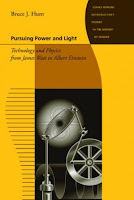Books:
2015
Os Seguidores de Maxwell [Portuguese translation of The Maxwellians](Editora Universidade Federal de Minas Gerais)
(Johns Hopkins University Press)
Articles:
2021
"Making Ohms: The Origins of Electrical Units and Standards," in Donard de Cogan, ed., Valentia: The Birthplace of World Communications (Kerry: Valentia Transatlantic Cable Foundation, 2021), pp. 26-29.
2020
“The Alternative Path: Oliver Lodge’s Lightning Lectures and the Discovery of Electromagnetic Waves,” in James Mussell and Graeme Gooday (eds.), A Pioneer of Connection: Recovering the Life and Work of Oliver Lodge (Pittsburgh: University of Pittsburgh Press, 2020)
2018
“Imperial Science: Victorian Cable Telegraphy and the Making of ‘Maxwell’s Equations,’” Proceedings of the Institute of Electrical and Electronics Engineers 106: 1458–65
2015
“Maxwell, Measurement, and the Modes of Electromagnetic Theory,” Historical Studies in the Natural Sciences 45: 303–39
2012
“Victorian Physics meets Industrial Capitalism”: retrospective essay review of Crosbie Smith and M. Norton Wise, Energy and Empire: A Biographical Study of Lord Kelvin (1989; 2009), in Metascience 21: 119–24
“Oliver Heaviside: A First-Rate Oddity,” Physics Today (November) 65: (11) 48–54
2007
“‘Our Friend of Brilliant Ideas’: G. F. Fitzgerald and the Maxwellian Circle,” European Review 15: 531–44
2004
“Lord Cable,” Europhysics News (November/December) 35: 186–88; Valencian (Catalan) translation published in Dau Al Deu: Rivista de Divulgacio Cientifica i Tecnologica (Summer 2018): 37–39
2003
“Electrical Theory and Practice in the Nineteenth Century,” in Mary Jo Nye (ed.), Volume V, Modern Physical and Mathematical Sciences, pp. 311–27, of David C. Lindberg and Ronald L. Numbers (eds.), The Cambridge History of Science (Cambridge: Cambridge University Press)
2002
“Lines of Force, Swirls of Ether,” in Bruce Clarke and Linda Dalrymple Henderson (eds.), From Energy to Information: Representation in Science, Art, and Literature (Stanford: Stanford University Press), pp. 99–113
1998
“Insulation for an Empire: Gutta-Percha and the Development of Electrical Measurement in Victorian Britain,” in Frank A. J. L. James (ed.), Semaphores to Short Waves (London: Royal Society of Arts), pp. 85–104
1997
“Doing Science in a Global Empire: Cable Telegraphy and Victorian Physics,” in Bernard Lightman (ed.), Victorian Science in Context (Chicago: University of Chicago Press), pp. 312–33
1996
“Scientists, Engineers and Wildman Whitehouse: Measurement and Credibility in Early Cable Telegraphy,” British Journal for the History of Science 29: 155–70
1994
“The Ohm is Where the Art Is: British Telegraph Engineers and the Development of Electrical Standards,” Osiris 9: 48–63
1991
“Rigorous Discipline: Oliver Heaviside versus the Mathematicians,” in Peter Dear (ed.), The Literary Structure of Scientific Argument: Historical Studies (Philadelphia: University of Pennsylvania Press), pp. 72–95
“Michael Faraday, Cable Telegraphy, and the Rise of British Field Theory,” History of Technology 13: 1–19
1988
“The Origins of the FitzGerald Contraction,” British Journal for the History of Science 21: 67–76
1987
“‘How My Model Was Right’: G. F. FitzGerald and the Reform of Maxwell’s Theory,” in Robert Kargon and Peter Achinstein (eds.), Kelvin’s Baltimore Lectures and Modern Theoretical Physics: Historical and Philosophical Perspectives (Cambridge: MIT Press), pp. 299–321
1986
“Experimenting on the Ether: Oliver J. Lodge and the Great Whirling Machine,” Historical Studies in the Physical and Biological Sciences 16: 111–34
1983
“‘Practice vs. Theory’: The British Electrical Debate, 1888–1891,” Isis 74: 341–55
“The Alternative Path: Oliver Lodge’s Lightning Lectures and the Discovery of Electromagnetic Waves,” in James Mussell and Graeme Gooday (eds.), A Pioneer of Connection: Recovering the Life and Work of Oliver Lodge (Pittsburgh: University of Pittsburgh Press, 2020)
“Imperial Science: Victorian Cable Telegraphy and the Making of ‘Maxwell’s Equations,’” Proceedings of the Institute of Electrical and Electronics Engineers 106: 1458–65
2015
“Maxwell, Measurement, and the Modes of Electromagnetic Theory,” Historical Studies in the Natural Sciences 45: 303–39
2012
“Victorian Physics meets Industrial Capitalism”: retrospective essay review of Crosbie Smith and M. Norton Wise, Energy and Empire: A Biographical Study of Lord Kelvin (1989; 2009), in Metascience 21: 119–24
“Oliver Heaviside: A First-Rate Oddity,” Physics Today (November) 65: (11) 48–54
2007
“‘Our Friend of Brilliant Ideas’: G. F. Fitzgerald and the Maxwellian Circle,” European Review 15: 531–44
2004
“Lord Cable,” Europhysics News (November/December) 35: 186–88; Valencian (Catalan) translation published in Dau Al Deu: Rivista de Divulgacio Cientifica i Tecnologica (Summer 2018): 37–39
2003
“Electrical Theory and Practice in the Nineteenth Century,” in Mary Jo Nye (ed.), Volume V, Modern Physical and Mathematical Sciences, pp. 311–27, of David C. Lindberg and Ronald L. Numbers (eds.), The Cambridge History of Science (Cambridge: Cambridge University Press)
2002
“Lines of Force, Swirls of Ether,” in Bruce Clarke and Linda Dalrymple Henderson (eds.), From Energy to Information: Representation in Science, Art, and Literature (Stanford: Stanford University Press), pp. 99–113
1998
“Insulation for an Empire: Gutta-Percha and the Development of Electrical Measurement in Victorian Britain,” in Frank A. J. L. James (ed.), Semaphores to Short Waves (London: Royal Society of Arts), pp. 85–104
1997
“Doing Science in a Global Empire: Cable Telegraphy and Victorian Physics,” in Bernard Lightman (ed.), Victorian Science in Context (Chicago: University of Chicago Press), pp. 312–33
1996
“Scientists, Engineers and Wildman Whitehouse: Measurement and Credibility in Early Cable Telegraphy,” British Journal for the History of Science 29: 155–70
1994
“The Ohm is Where the Art Is: British Telegraph Engineers and the Development of Electrical Standards,” Osiris 9: 48–63
1991
“Rigorous Discipline: Oliver Heaviside versus the Mathematicians,” in Peter Dear (ed.), The Literary Structure of Scientific Argument: Historical Studies (Philadelphia: University of Pennsylvania Press), pp. 72–95
“Michael Faraday, Cable Telegraphy, and the Rise of British Field Theory,” History of Technology 13: 1–19
1988
“The Origins of the FitzGerald Contraction,” British Journal for the History of Science 21: 67–76
1987
“‘How My Model Was Right’: G. F. FitzGerald and the Reform of Maxwell’s Theory,” in Robert Kargon and Peter Achinstein (eds.), Kelvin’s Baltimore Lectures and Modern Theoretical Physics: Historical and Philosophical Perspectives (Cambridge: MIT Press), pp. 299–321
1986
“Experimenting on the Ether: Oliver J. Lodge and the Great Whirling Machine,” Historical Studies in the Physical and Biological Sciences 16: 111–34
1983
“‘Practice vs. Theory’: The British Electrical Debate, 1888–1891,” Isis 74: 341–55



